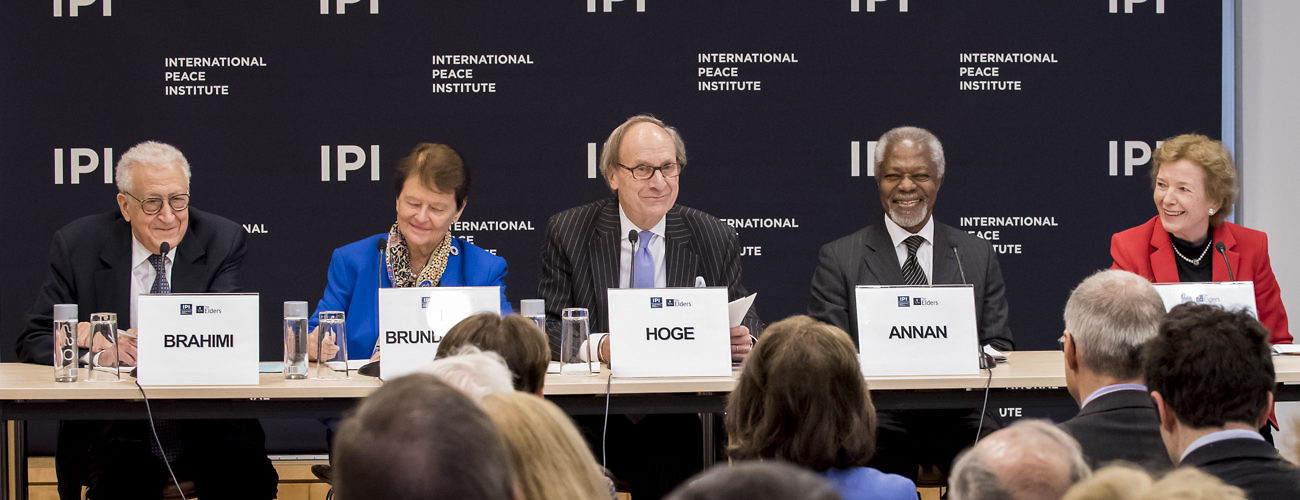Former United Nations Secretary-General Kofi Annan and three of his fellow Elders told a thronged audience at IPI on May 9th that multilateral diplomacy was the only way to address critical issues facing the world today like armed conflict, climate change, mass migration, nuclear proliferation, and bad governance.
“We need to work across national borders to resolve these issues,” said Mr. Annan, who led the UN from 1997 through 2006 and is now chair of the Elders, the independent group of global leaders founded by Nelson Mandela in 2007. “The UN is the only institution I know that can handle these crises and bring people together.”
The Elders’ vice-chair, Gro Harlem Brundtland, one-time prime minister of Norway and former Director-General of the World Health Organization, asked, “How can you govern a world somehow that is diversified with nearly 200 countries and different religions, unless you have multilateralism?”
She noted that the Scandinavian countries “have a very strong connection and conviction about the importance of the UN because we understand that as small countries and peaceful democracies the only way to achieve peace is multilateralism.”
Lakhdar Brahimi, longtime UN troubleshooter and former Minister of Foreign Affairs of Algeria, observed that, “in our globalized world, we say that conflict takes place in individual countries, but somehow we always forget that a conflict may begin in one country, but it never fails to spill over into others.”
The UN, he said, was “indispensable” to settling conflicts because “we always wait until conflict becomes international.” He argued too that all interventions “that take place outside the UN have been failures, catastrophic failures.”
Mary Robinson, first female president of Ireland and former UN High Commissioner for Human Rights, focused on the “other narrative happening in our world, a populist one” that was emerging in opposition to multilateralism. Speaking of “those who felt left out by globalization and encouraged to fear ‘the other’ by politicians,” Ms. Robinson acknowledged the nature of the opposition multilateralism currently faces.
“There is a very real need to understand those who do feel left behind, but the populist narrative that is appealing in terms of nationalism, in terms of a country being first is not the way,” she warned.
Mr. Annan illustrated the need for multilateralism by evoking the attitudes of military men he worked with while Under-Secretary-General for Peacekeeping at the UN. “I’m not surprised that the soldiers are telling us that the first line of defense is diplomacy,” he said, adding that he left that role believing that “declaration of war is too serious a matter to be left to the politicians and diplomats alone.”
Mr. Annan further said that he did not share the popular view that public servants are “not as efficient as business people.”
“We need to be careful with that,” he said, making the point that, “when it comes to diplomacy, you need relationships, you need to sustain that relationship so you’re able continue tomorrow if you don’t get a solution today.”
Mr. Brahimi put this argument in favor of multilateralism in contemporary context, advocating that stronger diplomatic efforts be made in Syria. “The Security Council must act responsibly and do the job they were created in 1945 to do,” he said, “Not to worry about American interests, Russian interests, Chinese interests… Their purpose will be served in full if they agree to worry about Syrian interests.”
The event was co-organized with the Elders.
IPI Senior Adviser Warren Hoge moderated the conversation.








